As the world becomes increasingly digital, the demand for skilled cybersecurity professionals is on the rise. Organizations across the globe are seeking individuals who can protect sensitive information, secure networks, and prevent cyber threats. One of the best ways to enter the field of cybersecurity or advance in your career is by earning the right certifications. However, with so many options available, choosing the right cybersecurity certification can be daunting. In this blog, we’ll help you navigate the process by covering several key points to consider when selecting the right cybersecurity certification for you.
Related Blog: Top Cyber Security Certifications
Identify Career Goals
Before diving into the specifics of cybersecurity certifications, it’s essential to assess your personal interests and career aspirations. Cybersecurity is a broad field, with various specializations, including:
- Network Security: If you’re interested in securing networks from threats, firewalls, VPNs, and intrusion detection systems (IDS), this could be the area for you.
- Ethical Hacking: Ethical hackers, or penetration testers, identify weaknesses in systems before malicious hackers can exploit them. If you’re fascinated by hacking but want to do it legally, this could be your niche.
- Incident Response: If you’re more inclined toward handling security breaches and minimizing damage, incident response could be the right fit. Incident responders are responsible for managing and analyzing cyber-attacks.
- Cloud Security: With the increasing adoption of cloud computing, cloud security specialists are in high demand. If you have an interest in cloud infrastructure and security protocols, this path is gaining traction.
- AI and Machine Learning in Security: As AI and machine learning technologies grow, cybersecurity roles involving these technologies are becoming more critical. If you’re interested in the intersection of AI and security, certifications in this domain can give you a competitive edge.
By identifying your area of interest, you’ll be better equipped to choose a certification that aligns with your passions and long-term career goals.
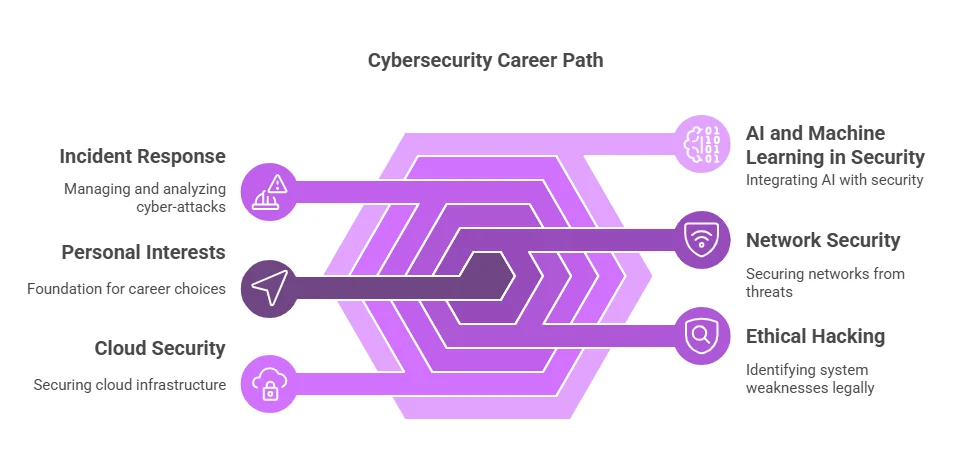
Industry Requirements
Different industries have specific cybersecurity needs, and as such, certain certifications are required or highly recommended for various roles. Here’s how certifications can vary based on industry:
- Banking and Financial Services: The financial sector, given the sensitive nature of its data, requires robust security measures. Certifications like Certified Information Systems Security Professional (CISSP) or Certified Ethical Hacker (CEH) are popular in this industry. Regulatory standards such as PCI DSS (Payment Card Industry Data Security Standard) may also drive the need for specific certifications.
- Healthcare: Healthcare organizations are responsible for securing patient data under regulations like HIPAA. Certifications such as Certified Information Security Manager (CISM) or Certified in Healthcare Security (CHS) are valuable for professionals working in this field.
- Government: Government roles often require individuals to have clearances and knowledge of classified information. Certifications such as Certified Information Systems Auditor (CISA) or CompTIA Security+ are often required for government cybersecurity roles.
- General Industry: For general cybersecurity roles, certifications like Certified Cloud Security Professional (CCSP) and CompTIA Cybersecurity Analyst (CySA+) are universally recognized and can open doors across various sectors.
By aligning your certifications with the industry you’re aiming to work in, you’ll increase your chances of meeting the specific security requirements of employers in that field.
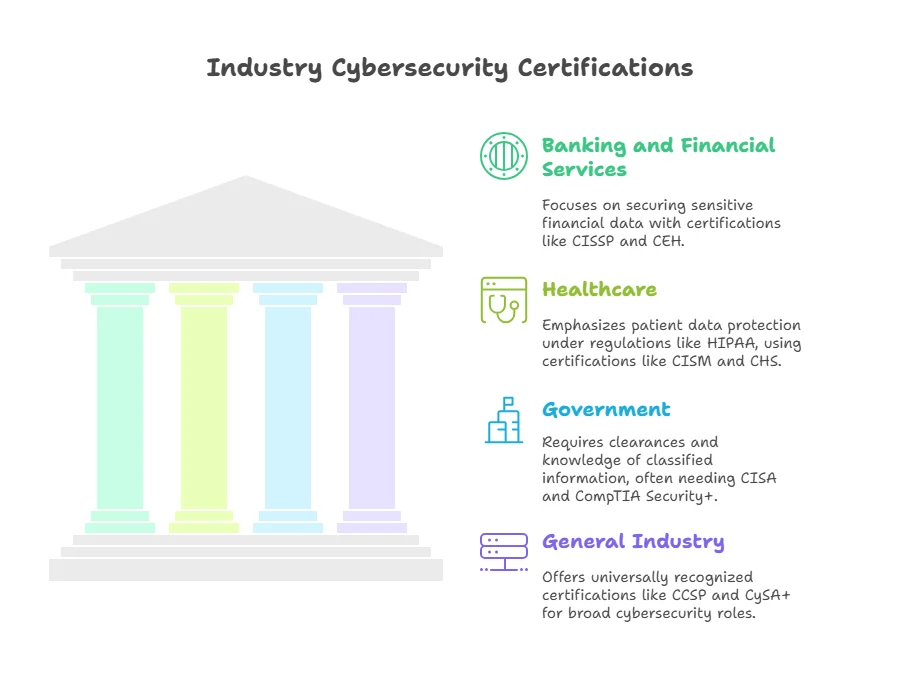
Certifications Based on Expertise Level
Cybersecurity certifications vary in complexity, so it’s important to choose one that matches your current level of expertise. Here’s a breakdown of certifications based on expertise level:
- Entry-Level Certifications: If you’re new to cybersecurity, it’s best to start with certifications that lay a solid foundation in the basics. Some of the top entry-level certifications include:
- CompTIA Security+: A great starting point for those entering the cybersecurity field, covering basic security concepts, risk management, and network security.
- Certified Cybersecurity Associate (CCA): This certification introduces fundamental cybersecurity concepts and helps you build a base for more advanced certifications.
- Intermediate Certifications: Once you have a grasp on the basics, you can move on to more specialized certifications that will open up new career paths:
- Certified Ethical Hacker (CEH): Ideal for those interested in ethical hacking, penetration testing, and finding vulnerabilities.
- CompTIA Cybersecurity Analyst (CySA+): Perfect for individuals seeking to specialize in threat detection and analysis.
- Advanced Certifications: For those who want to advance their career or take on senior-level roles, certifications like:
- Certified Information Systems Security Professional (CISSP): A globally recognized certification for experienced security practitioners, covering a broad range of topics.
- Certified Cloud Security Professional (CCSP): Focuses on cloud security and is ideal for those working with cloud systems.
By choosing the right level of certification, you’ll be able to build on your skills gradually and ensure that you’re ready for more advanced roles as your career progresses.
Related Blog: Cyber Security Certifications for Beginners
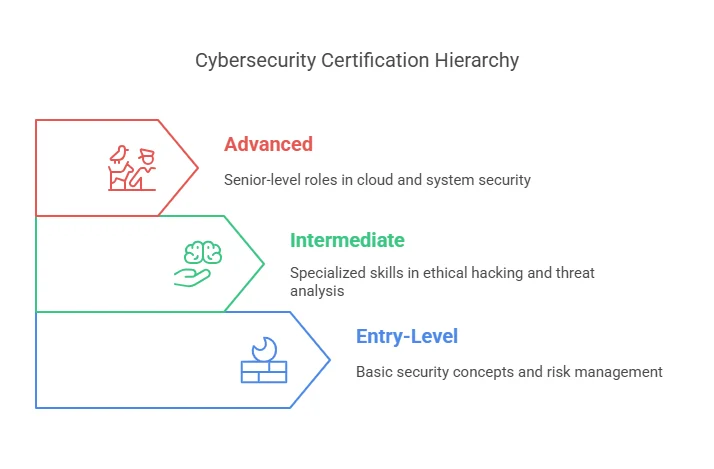
Hands-on Experience vs. Certification
While certifications are a great way to validate your knowledge, they should complement real-world, hands-on experience. Here’s how practical experience can work alongside certifications:
- Theory vs. Practice: Certifications provide you with theoretical knowledge, but hands-on experience allows you to apply that knowledge in real-world scenarios. It’s essential to have both for success in the cybersecurity field.
- Lab Environments: Many certification programs provide access to lab environments where you can practice real-world techniques. This is especially important for certifications like CEH and CompTIA Security+ that require practical knowledge of tools and techniques.
- Internships and Volunteer Opportunities: Gaining experience through internships or volunteering with cybersecurity organizations can help you get familiar with tools and protocols in a professional setting.
Ultimately, certifications and hands-on experience work best when paired together, as practical skills ensure you can apply the theoretical knowledge gained from certifications effectively.
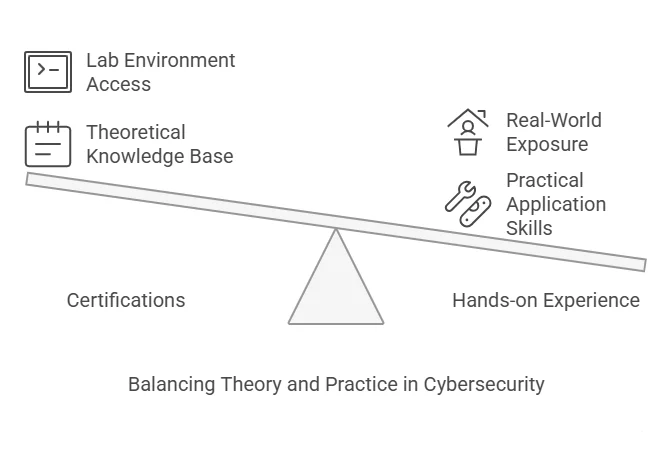
Duration and Preparation Time
Balancing work, personal life, and study time can be challenging, but with proper planning, you can manage your preparation effectively. Here’s how to approach the duration and preparation time for cybersecurity certifications:
- Assess Study Time: For entry-level certifications like Security+, expect to dedicate about 3 to 6 months of study time. Intermediate and advanced certifications will require longer preparation times due to the complexity of the topics.
- Study Plan: Break down the topics into manageable sections and set daily or weekly goals. Utilize online courses, study guides, practice exams, and forums to help with your learning.
- Full-Time vs. Part-Time Study: If you’re working full-time, consider part-time study options that allow you to progress without overloading yourself. Many online programs offer flexible learning schedules to fit your personal life.
- Certifications with Shorter Timelines: Some certifications, such as CompTIA Security+ or Certified Ethical Hacker (CEH), can be completed in a relatively short time compared to more advanced ones like CISSP, which may take a year or more to complete.
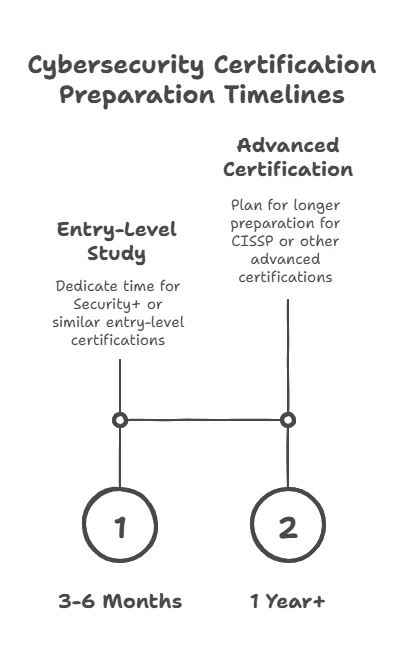
Future Growth
Cybersecurity is a rapidly evolving field, and it’s important to choose certifications that will help you stay relevant as new technologies emerge. Consider the future growth potential in areas such as:
- Cloud Security: As more companies migrate to the cloud, certifications like Certified Cloud Security Professional (CCSP) are in demand.
- Artificial Intelligence (AI) and Machine Learning: The integration of AI in cybersecurity for threat detection and prevention is growing. Certifications in AI and machine learning in cybersecurity could position you for roles in emerging fields.
- Blockchain Security: With the rise of cryptocurrencies, blockchain security certifications are becoming increasingly important for professionals interested in securing digital currencies and decentralized systems.
By considering the long-term growth potential of emerging technologies, you’ll ensure that your chosen certification keeps you competitive in the ever-changing cybersecurity landscape.
Related Blog: Advanced Cyber Security Certifications: A Pathway to Career Advancement
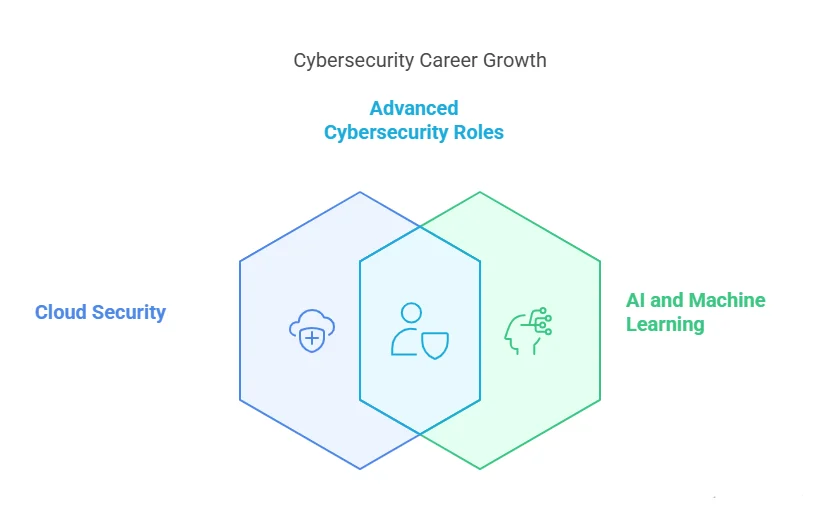
Conclusion
Choosing the right cybersecurity certification is a critical step toward advancing your career. By understanding your career goals, industry requirements, expertise level, the value of hands-on experience, and the time commitment involved, you’ll be well-equipped to make an informed decision. As the field continues to evolve, certifications will continue to play a crucial role in equipping professionals with the skills they need to protect critical data and systems.
At ACSMI, we offer various certifications tailored to help you advance in your career in cybersecurity. Whether you’re just starting or looking to enhance your skills, our comprehensive training programs can help you gain the expertise needed to succeed.
Frequently Asked Questions (FAQs)
What is the best certification for someone starting in cybersecurity?
The CompTIA Security+ certification is a popular choice for beginners, as it covers essential cybersecurity concepts and is recognized across industries.
How long does it take to get certified in cybersecurity?
The duration depends on the certification level. Entry-level certifications may take 3 to 6 months of preparation, while advanced certifications can take over a year.
Do I need hands-on experience to pass cybersecurity certifications?
While certifications provide theoretical knowledge, hands-on experience is crucial. Many certifications offer labs or practical exams to simulate real-world scenarios.
Which cybersecurity certification is most in demand?
Certified Information Systems Security Professional (CISSP) and Certified Ethical Hacker (CEH) are widely recognized and highly sought after.
How can I balance study and work while preparing for a certification?
Plan a study schedule that fits your work and personal life. Many certification programs offer flexible learning options, and you can break down study sessions into manageable tasks.

Leave a Reply